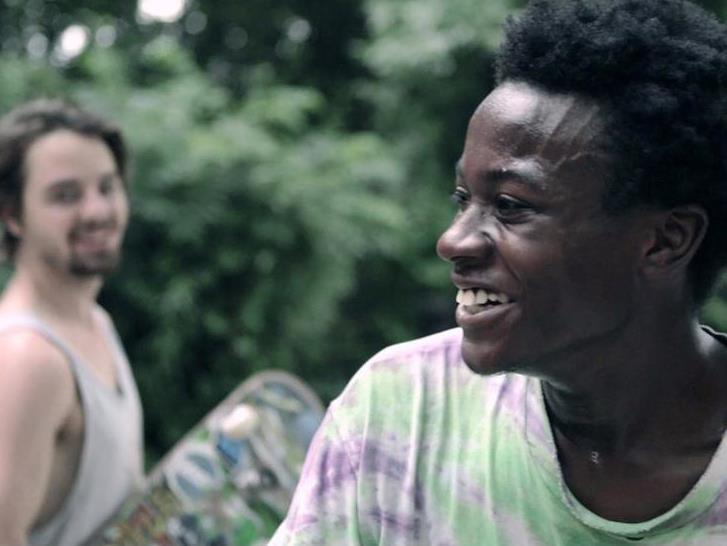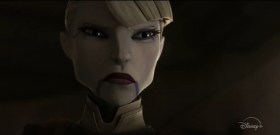Minding the Gap.
Accompanied by the sight of young men blissfully taking to their skateboards, Minding the Gap begins with a statement that doubles as a rallying cry about masculinity. The skaters have just been trying to scale a building, but change their plans due to the risk involved, putting their wellbeing before their potential thrills. ‘Your whole life, society tells you “oh be a man, be strong, you’re tough”,’ the film’s voiceover explains. ‘[But] you don’t grow up thinking that’s the way you are.’ The idea that boys can just exist without labels, and that the men they grow into should be able to as well, cuts to the core of this perceptive documentary – a feature that’s both a specific snapshot of its subjects, and a movie of inescapable broader relevance. That said, discarding rigid masculine ideals is truly just the beginning of Minding the Gap’s insightful, sorrowful chronicle.
It’s the outspoken, laidback Zack Mulligan who utters Minding the Gap’s first discerning words. Alongside Keire Johnson and first-time director Bing Liu (who also doubles as producer, cinematographer and co-editor), he’s one of the film’s three focal points. Compiled from years of intimate home video footage and largely shot in their hometown of Rockford, Illinois, the documentary that examines their lives is as much about how skateboarding offers a respite from trying times as it is about individual journeys from young adulthood to actual adulthood. Again, Mulligan has the right turn of phrase to describe their situation: ‘we formed a family together to look out for each other because no one else was looking out for us.’
Just what family means is a slippery subject in Liu’s feature. Similarly thorny is the notion of masculinity, even with Mulligan vocally recognising the problems of traditional manliness. Indeed, what it means to belong and to be male are inseparable in Minding the Gap, as its intertwined threads demonstrate. Mulligan becomes a father at 23, long before he’s ready, and struggles with the responsibilities of being a parent and partner. Teenager Johnson works at a job he hates to make a better life, while trying to come to terms with his complicated feelings for his deceased dad, as well as his place in the world as an African-American. Liu, who gives his own tale less screen time but still stresses its importance, focuses on his estranged mother and brother to explore their relationship with his physically abusive stepfather. Indeed, by bringing his tearful mum into the film – and Mulligan’s increasingly exasperated girlfriend Nina as well – he stresses, heartbreakingly, how the ramifications of toxic masculinity always ripple across genders and generations.
Based on Minding the Gap’s opening moments and Mulligan’s introductory words of wisdom, it’s easy to expect the documentary to chart a certain narrative. And yet, part of what makes the film so potent and affecting is Liu’s eschewing of convention and simplicity again and again. He doesn’t sugar-coat his and his pals’ experiences, or embellish their lives today, or paint a rosy picture of the people they’ve become. He doesn’t let friendship colour the movie’s position on certain choices, behaviour and philosophies, and he certainly doesn’t try to make a neat, pleasant portrait out of their reality. The matters that Mulligan, Johnson and Liu have had to deal with are difficult, complex and messy, as domestic violence, broken families, absent parents and the like always are. Minding the Gap never claims or feigns otherwise, instead sensitively depicting and dissecting the cycle that its central figures and their loved ones have been trapped within.
It’s with a love for ‘90s-made adolescent-oriented fare like Kids and Slacker that Liu crafts his 2018 Sundance Special Jury Award-winner, but with a skateboarder’s eye that he lenses and edits, the latter with Joshua Altman (The Final Year). Some of the film’s style stems from the footage’s original purpose – clips of skateboarding shot by a skateboarder on a skateboard, for example. Much of it comes from knowing how crucial a sense of rhythm and a feeling of immersion can be. Sporting a board bearing the words “this device cures heartache” at one point, Johnson describes skating’s appeal as offering control in a world that’s so often chaotic, and it’s both this precision and looseness that shines through in Liu’s lyrical imagery. To understand the stories of Minding the Gap’s core trio, to see them as more than statistics and familiar tales of woe and to genuinely take them to heart requires not only witnessing the ups and downs, but experiencing what dysfunction, destruction and devastation feels like – and experiencing the momentary release, catharsis and euphoria of gliding on a board with your friends, too.
Rating: 4 ½ stars ★★★★☆
Minding the Gap
Director: Bing Liu
US, 2018, 93 mins
Release date: January 17
Distributor: ACMI
Rated: 15+
Actors:
Director:
Format:
Country:
Release:





